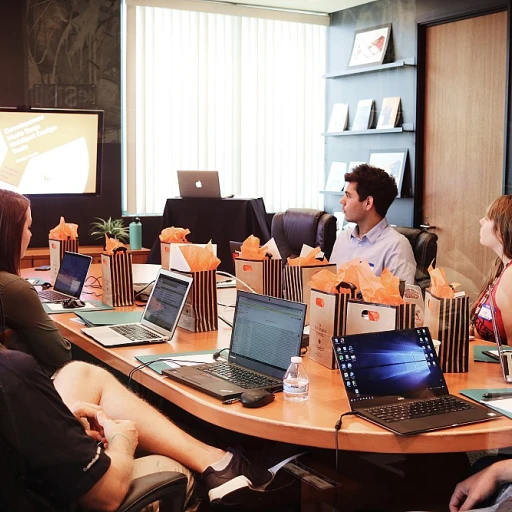
Understanding Job Branding
Defining Job Branding as a Crucial Element
Job branding has emerged as a cornerstone of effective employer branding strategies. It is not merely about crafting attractive job descriptions; it involves creating a narrative that resonates with potential candidates, employees, and stakeholders. A strong employer brand can significantly influence the quality of talent a company attracts, and it plays a vital role in the recruitment process. Job branding encapsulates a company's ethos, values, and culture, differentiating it from competitors. For candidates, it offers insights into what it's like to work at an organization, adding dimension to the otherwise static list of requirements. This process can enhance candidate experience by aligning personal branding with organizational goals, ultimately attracting top talent. Central to job branding is how well a company articulates its mission and work environment. In a competitive job market, offering a glimpse into the life balance, employee satisfaction, and overall work culture of an organization can be a decisive factor for job seekers. As job seekers increasingly prioritize cultural fit over traditional factors like salary, job branding speaks volumes about what candidates can expect in terms of career growth and a supportive work environment. A robust job branding strategy not only aids in attracting candidates but also ensures that they are the right fit for the company’s culture. To delve deeper into the evolving journey from recruitment to establishing a recognized employer brand, you can explore the latest trends in talent acquisition that are shaping this dynamic landscape.The Role of Company Culture in Job Branding
When diving into the realm of job branding, the importance of company culture cannot be overstated. It's more than just an organization’s personality; it's the core foundation that influences every aspect of your employer brand. An authentic and well-established company culture not only attracts but also retains top talent, ensuring that your recruitment process is both effective and enduring.
The Impact of Company Culture on Brand Perception
Company culture plays a vital role in shaping the brand perception both among current employees and potential candidates. A strong culture creates a memorable work environment that employees are proud to be a part of, transforming them into brand ambassadors. When your employees speak positively about their work experience, it bolsters your organization’s reputation, drawing in job seekers who are searching for a values-driven place to grow their careers.
Aligning Culture with Recruitment Strategies
Aligning your company culture with your recruitment strategies is crucial. This involves clearly defining your organization's values and ensuring these values are reflected in your job descriptions and the overall application process. Companies with a strong culture often find that their recruitment process is smoother, attracting candidates whose personal branding aligns with the company’s ethos, leading to a more cohesive and motivated workforce.
Enhancing Employee Satisfaction through Cultural Alignment
Employees who resonate with an organization's culture show increased levels of satisfaction and engagement. This alignment not only improves employee retention but also enhances productivity. A well-cultured work environment promotes work-life balance, a factor highly valued by modern job seekers, making it a crucial element of your employer branding strategy.
Cultivating a Culture of Transparency and Communication
Finally, transparency and open communication are cornerstones of a robust company culture. When employees feel informed and heard, they are more likely to contribute positively to the company’s objectives. This not only enriches the employee experience but also strengthens the overall employer brand, making your organization attractive to prospective candidates.
For a deeper understanding of how company culture shapes modern recruitment strategies, check out Understanding the Modern Candidate Profile.
Leveraging Social Media for Job Branding
Harnessing Social Media to Amplify Your Employer Brand
In today's digital age, social media has emerged as a powerful platform for job branding. It offers a dynamic avenue where companies can showcase their culture and attract top talent by fostering a strong employer brand. Social media is not just a tool for marketing products or services; it's equally significant in portraying an organization's work environment and culture. Social media platforms like LinkedIn, Twitter, and Instagram provide unique opportunities for brands to connect with candidates seeking a blend of personal and professional growth in their careers. As a company, leveraging these platforms allows you to offer a glimpse into your organization’s work life balance, culture, and what it truly means to be part of your team.- Creating Authentic Content: The key to successful social media employer branding lies in authenticity. Share real stories from employees about their experiences, projects, and accomplishments within the company. This authenticity helps job seekers envision themselves in your organization, impacting their application process and candidate experience positively.
- Engaging Visual Content: Utilize videos and images to provide visual insights into your work environment. An appealing visual representation of your company culture can capture the attention of candidates actively in the job search.
- Interactive Engagement: Encourage employees to participate by sharing their personal brand stories and experiences. This advocacy not only strengthens your employer branding efforts but also enhances employee satisfaction as they play a pivotal role in the recruitment process.
Employee Advocacy as a Job Branding Tool
Harnessing Employee Influence
In today's competitive job market, the voice of employees is more potent than ever. As professionals seek transparency and authentic insights, empowering your workforce to become brand ambassadors can significantly amplify your employer brand's reach. Employee advocacy initiatives foster a sense of belonging and pride, leading to increased employee satisfaction. When employees authentically share their positive experiences, they create compelling narratives that resonate with potential candidates. This organic spread of information offers genuine glimpses into your company's culture and work environment.Creating Engaging Content
Encouraging employees to produce content such as blogs, videos, or social media posts about their work life and achievements can effectively enhance your brand. These personal stories highlight the unique aspects of your organization, strengthening your recruitment process by attracting top talent who align with your values.Supporting Personal Branding
Providing employees with tools and opportunities to build their personal brand not only benefits them professionally but also enhances your organization's overall perception. As employees develop their careers within your company, they inadvertently position your brand as a desirable career destination. By investing in comprehensive advocacy programs, you not only improve your employer brand but also enrich the candidate experience, helping your company stand out in the job search journey. This not only improves retention but entices potential candidates who seek a positive and fulfilling workplace experience.Measuring the Success of Job Branding Efforts
Evaluating the Impact of Your Branding Strategies
Measuring the success of job branding efforts is crucial for any organization aiming to attract top talent and maintain a strong employer brand. Understanding how your strategies are performing can help refine your approach and ensure that your company remains competitive in the recruitment process.
Key Metrics to Consider
When assessing the effectiveness of your employer branding, consider the following metrics:
- Candidate Experience: Evaluate feedback from job seekers about their application process and interview experience. Positive experiences can enhance your brand's reputation.
- Employee Satisfaction: Regular surveys and feedback sessions can provide insights into how employees perceive the company culture and work environment.
- Social Media Engagement: Monitor interactions on platforms where your brand is active. High engagement rates can indicate a strong employer presence.
- Recruitment Metrics: Track the time-to-hire and quality of candidates attracted. A decrease in time-to-hire and an increase in candidate quality can signal effective branding.
Tools and Techniques for Measurement
Utilizing the right tools can streamline the measurement process:
- Analytics Platforms: Tools like Google Analytics can help track traffic to your careers page and assess the effectiveness of your recruitment campaigns.
- Employee Feedback Tools: Platforms such as SurveyMonkey or Qualtrics can facilitate regular employee feedback collection.
- Social Listening Tools: Tools like Hootsuite or Brandwatch can help monitor social media mentions and sentiment around your employer brand.
Continuous Improvement
Measuring success is not a one-time process. Regularly reviewing these metrics and adapting your strategies based on the data will ensure that your employer branding efforts remain effective and aligned with your organizational goals. By doing so, you can foster a positive work environment and attract candidates who are not only qualified but also a cultural fit for your company.













